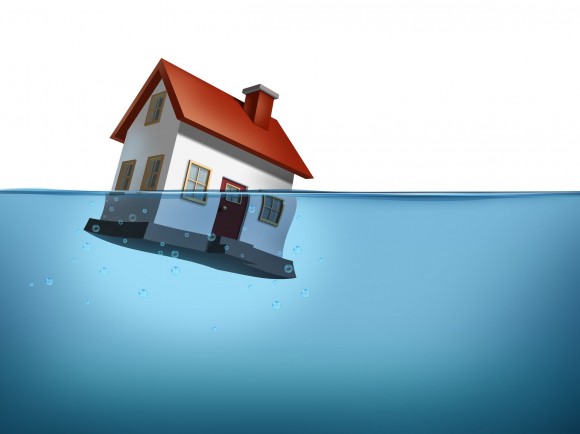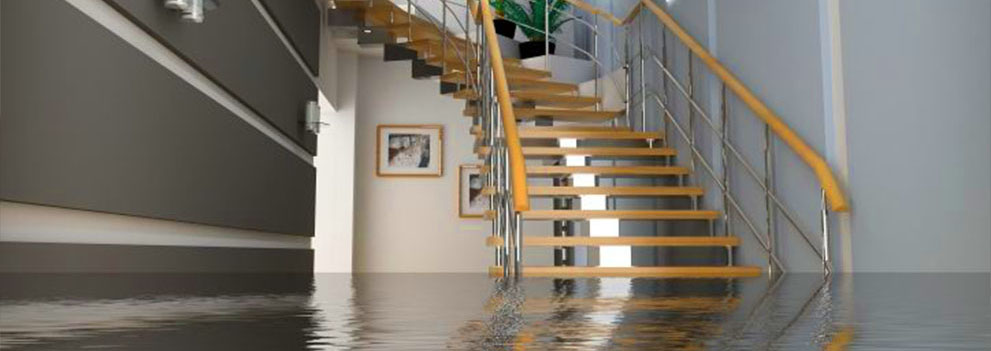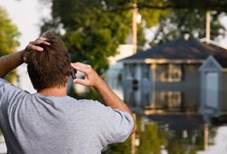|
What is the deductible for flood insurance?
A flood policy comes with separate deductibles for the building and its contents. You typically get to choose the deductible amount. Common flood deductibles range from $1,000 to $5,000. As with other types of insurance, a higher deductible on your flood policy will result in a lower premium; however, if you have a mortgage, your lender may not allow you to increase your deductible beyond specified limits. What does flood insurance cover? Flood insurance covers losses directly resulting from flooding or flood-related erosion caused by heavy or prolonged rain, snowmelt, coastal storm surges, blocked storm drainage systems, levee dam failure and similar events. Flood insurers reimburse policyholders for structural damage, including:
The FEMA flood insurance guide is also a helpful resource that provides details on claims, coverage and costs. Flood insurance coverage limits The NFIP lets you insure your house for up to $250,000 and your personal property (contents) for up to $100,000. If you rent, you can buy up to $100,000 in coverage for your belongings. For non-residential property, you can buy up to $500,000 of coverage for the building and contents.
0 Comments
When was the last time you considered the air quality in your home? It’s easy to forget about something invisible, but like many around-the-house tasks, clearing the air is well worth your effort. In the interest of health, safety and keeping your home in good shape, here are a few steps you can take to help your family breathe a little easier. 1. Test for radon gas and install carbon monoxide detectors. You can’t see, taste or smell radon and carbon monoxide, but these indoor gases can be dangerous to your health and safety if left undetected.
2. Run an air purifier to clear allergens and pollutants. Improve your indoor air quality by filtering out pollen, dust, pet hair and other irritants. If anyone in your household becomes sick with COVID-19, running an air purifier in their quarantine room may provide some protection from floating virus particles. HEPA air purifiers can also help remove smoke particulates during wildfires. 3. Use a dehumidifier. Is your home prone to dampness? Keep your humidity level under 50% to prevent mold growth. Run a dehumidifier (and clean it regularly) as well as the exhaust fan in your bathroom(s) after every shower. 4. Follow these daily best practices. In addition to testing and equipment purchases, these simple habits can help maintain your indoor air quality:
It’s a good idea to review your insurance coverage at least once a year to ensure that your family and belongings are appropriately protected. You’ll also want to review your coverage any time you’ve made a major purchase or experienced a significant life event, such as getting married, buying a house, sending your child off to college or receiving an inheritance. These life moments are considered insurance-qualifying events (also known as life-changing events for purposes of insurance), and it’s important to make sure your coverage is up to date to protect the people and things that matter most to you.
Have you had a life-changing event that might require an adjustment to your insurance coverage? Here’s some information to consider, which can help ensure that you’ve got the coverage you need to protect your loved ones and belongings. A good place to start is by doing an insurance review. What Is an Insurance Review? An insurance review is a thorough look at your insurance coverage – the policies protecting your vehicles, home, family members and other valuables. To review your insurance coverages, enlist the help of an experienced agent to tap into their expertise and knowledge. An agent will be knowledgeable about the available insurance products and can provide professional guidance on which coverages may be best for your unique situation. The Benefits of an Insurance Review An insurance review helps provide you the peace of mind that your most treasured belongings (and family members) are adequately protected in case something unexpected happens like a fire, theft or weather event. A review could also result in a potential reduction in your insurance costs if, for example, your agent discovers you are eligible for discounts, or that you require less coverage than you did previously. Why (and When) Should You Review Your Insurance Coverage?It is critical to review your insurance coverage regularly to help ensure that your property, your possessions and your loved ones are well protected. During an insurance review, you should evaluate your home insurance (or renters insurance), car insurance and any other policies you have in your name. When should you do a review? When your circumstances have changed, or you have what’s considered a “qualifying event” or a “life-changing event” in insurance terms, you may want to consider an insurance review. As mentioned earlier, these events include things like having a baby, getting married and other big milestones. You should also consider an insurance review any time your policies are up for renewal. This is typically once per year. What’s an Insurance-Qualifying Event? Insurance-qualifying events are those moments when life circumstances change. Since these events can occur throughout the period of an insurance policy, you’ll want to check with your agent when an insurance-qualifying event occurs outside of the typical policy renewal time frame. A qualifying or life-changing event, for insurance purposes, typically means:
Other Times You May Want an Insurance Review In addition to those life events that might prompt an insurance review, there are other times that you may want to check with your insurance agent to review your coverage. For example, if you have expensive, high-value possessions on your property or are taking steps to increase the safety of your home, such as by adding an alarm system or upgrading your electrical system, those situations may warrant a fresh look at your insurance coverage. If natural disasters (for example, hurricanes) have increased in your area, you also may want to consider updating your policy to reflect these added risks. Check with your insurance agent for guidance. How Often Should You Change Your Coverage? Though you might review your policies annually, that doesn’t mean you’ll always need to make a change that often. In many cases, your current coverage may still be adequate. But generally, it’s a good idea to review all of your insurance needs at least once a year. If you have a major life change, contact your insurance agent or company representative, as the change in your life may have an impact on your insurance needs.1 How Current Is Your Household’s Insurance Coverage? If you haven’t conducted an insurance review recently (or you’ve experienced a major life event or acquired additional property of significant value since you last renewed your policy), it might be time to evaluate your coverage. No matter what type of insurance you are considering, whether it be health insurance or fire insurance or even flood insurance, you should always follow the same general rule and that is to pick the coverage that suits your situation best. The same is true when picking Van Insurance also.
Further explanation, the people whose greed would be bailed out, Corporate America, would be bailed out. So the money was given to the thieves. In what system does anyone learn not to do the right thing, and you will be rewarded? I personally would have rather the people who did wrong end up homeless, or lose their jobs. Sue -My dad sells insurance. The people who buy it don't know for sure they will need it. They don't want to get sick or die. But they buy insurance to protect their families just in case. That way if something bad happens, they'll be protected. So just in case global warming does hurt our earth, we need to protect ourselves ahead of time. It's like Flood Insurance. How about you? What natural disasters could cause your problems? Have you taken even the smallest steps to prepare? If and how you survive depends on these answers. I have to tell you, I've been in more than one. I've been in a major flood, a large tornado, ice storms, a blizzard and Northridge. I don't want to do any of them again. However, for most, we were ready. The reputation of a mold remediation company is important. By reading reviews about a company and even talking to those who have used the company, you should be able to find out whether a particular company can be trusted. You will not want a company that has a reputation for not leaving things neat and in order or at least trying to leave them somewhat better than when they arrived. Phil - Remember the air movement is what ends up as our weather. Hurricanes begin off the coast of Africa and then go to the Caribbean. Our earth has one big atmosphere. The air circulate all over the world. So then, don't be fooled by asking "How much house can I afford?". The real truth is that none of us can afford to lose our home. Use your hard earned income judiciously, be reasonable and anticipate unforeseen expenses. Then, you can be reasonably confident that you will not lose your new home, but instead will be able to truly enjoy it, because you asked the right question. |
better Insurance
|
-
HOME
- Send me a Home Insurance Quote >
- FLOOD Insurance, Massachusetts >
- Cape Cod Home Insurance
- Pay Your Home Insurance Bill Online
- Ordinance or Law Coverage
- How to Prevent a Claim on your Home Insurance Policy
- Videos - Cape Cod Real Estate Tips >
- Cape Cod Massachusetts Arbella Insurance Discounts
- Cape Cod Massachusetts Lloyds of London Home Insurance
- Safety Insurance Discounts for Cape Cod, Massachusetts
- MPIUA - MA Property Insurance Underwriting Association "Fair Plan"
- Cape Cod Massachusetts Home Protection Insurance
- Hurricane Preparedness >
-
AUTO
- Send me an Auto Insurance Quote for Cape Cod, Massachusetts
- BOAT Insurance >
- Cape Cod, MA Dept. of Motor Vehicles
- Cape Cod Massachusetts - Report an Auto Insurance Claim
- Auto Insurance Quote - CAR BUYING TIPS : Auto Insurance for Cape Cod, MA
- InControl Driver Training
- Car Insurance for Cape Cod Massachusetts - Arbella Insurance - Send me an Auto Quote >
- Plymouth Rock - Send me an Auto Quote >
- Encompass Insurance Discounts
- Safety Insurance - Send me an Auto Quote >
- Travelers Insurance Discounts
- Progressive Insurance - Send me an Auto Quote
- LIFE
- OFFICES
- ABOUT US
- Stay Home
- Home Insurance Explained
- Agent Login
- Privacy Policy
- Videos - Cape Cod Real Estate Investing, Taxes & Insurance
- Videos - Cape Cod Coastal Real Estate
- Português
Arthur D. Calfee Insurance Agency, Inc. is a friendly local insurance agency proudly offering Massachusetts, Cape Cod and the Islands. A-Excellent AM Best rating, A+ Excellent by the BBB
Using innovative thinking, cutting-edge tools and expert resources at national and local levels, we deliver the best possible outcome on every policy we manage. Need Home Insurance? Easy, Fast, & Secure Home Insurance. Get Free Quotes 100% Online Now! Available 24/7. Affordable Rates. Cover Your Biggest Investments. Get a homeowners insurance quote, find coverage options. We'll help you understand and customize the right home insurance coverage for you.
Home is where your heart is—along with a healthy chunk of your net worth. Get started today with a free homeowner's quote.
Compare home insurance quotes today and save on protection for your biggest investment. Build a Custom Policy & Make the Switch! Our local underwriting professionals focus exclusively on finding the best home insurance, homeowner's insurance, hazard insurance, investment property insurance, flood insurance, flood zone information, vacation home insurance, second home insurance, auto insurance, collector car insurance, business insurance, general liability insurance, property insurance, professional liability insurance, contractor's liability insurance, worker's comp insurance, key man insurance, whole life insurance, term life insurance, group or personal disability, & long-term care insurance policies to patrons in the following Cape Cod, Massachusetts towns, communities and villages: Barnstable, Bourne, Pocasset, Brewster, Buzzards Bay, Centerville, Chatham, Cotuit, Craigville, Dennis, East Dennis, Eastham, Falmouth, East Falmouth, Hatchville, West Falmouth, North Falmouth, Woods Hole, Harwich, Hyannis, Hyannisport, Martha's Vineyard, Nantucket, Marstons Mills, Mashpee, Orleans, Osterville, Provincetown, Sandwich, Sagamore, Sagamore Beach, Truro, Wellfleet, Yarmouth, and Yarmouthport. Real-Time Pricing. Insurance coverage: Wind Damage, Fire Loss, Water Damage. Protect your home and belongings. Low Rates For Your Best Options to Save Money On Great Coverage! Get a quote today. Home insurance helps protect your house and your family.
Using innovative thinking, cutting-edge tools and expert resources at national and local levels, we deliver the best possible outcome on every policy we manage. Need Home Insurance? Easy, Fast, & Secure Home Insurance. Get Free Quotes 100% Online Now! Available 24/7. Affordable Rates. Cover Your Biggest Investments. Get a homeowners insurance quote, find coverage options. We'll help you understand and customize the right home insurance coverage for you.
Home is where your heart is—along with a healthy chunk of your net worth. Get started today with a free homeowner's quote.
Compare home insurance quotes today and save on protection for your biggest investment. Build a Custom Policy & Make the Switch! Our local underwriting professionals focus exclusively on finding the best home insurance, homeowner's insurance, hazard insurance, investment property insurance, flood insurance, flood zone information, vacation home insurance, second home insurance, auto insurance, collector car insurance, business insurance, general liability insurance, property insurance, professional liability insurance, contractor's liability insurance, worker's comp insurance, key man insurance, whole life insurance, term life insurance, group or personal disability, & long-term care insurance policies to patrons in the following Cape Cod, Massachusetts towns, communities and villages: Barnstable, Bourne, Pocasset, Brewster, Buzzards Bay, Centerville, Chatham, Cotuit, Craigville, Dennis, East Dennis, Eastham, Falmouth, East Falmouth, Hatchville, West Falmouth, North Falmouth, Woods Hole, Harwich, Hyannis, Hyannisport, Martha's Vineyard, Nantucket, Marstons Mills, Mashpee, Orleans, Osterville, Provincetown, Sandwich, Sagamore, Sagamore Beach, Truro, Wellfleet, Yarmouth, and Yarmouthport. Real-Time Pricing. Insurance coverage: Wind Damage, Fire Loss, Water Damage. Protect your home and belongings. Low Rates For Your Best Options to Save Money On Great Coverage! Get a quote today. Home insurance helps protect your house and your family.
Testimonials & Endorsements for the Best Insurance Agent on Cape Cod, MA
PHONE: (800) 479-2601 CUSTOMER SUPPORT & SERVICE
Please note: The above is meant as general information to help you understand the different aspects of insurance. This information is not an insurance policy, does not refer to any specific insurance policy, and does not modify any provisions, limitations, or exclusions expressly stated in any insurance policy. Descriptions of all coverages and other features on this page are necessarily brief; in order to fully understand the coverages and other features of a specific insurance policy, we encourage you to read the applicable policy and/or speak to an insurance representative. Coverages and other features vary between insurers, vary by state, and are not available in all states. Whether an accident or other loss is covered is subject to the terms and conditions of the actual insurance policy or policies involved in the claim. References to average or typical premiums, amounts of losses, deductibles, costs of coverages/repair, etc., are illustrative and may not apply to your situation. We are not responsible for the content of any third-party sites linked from this page.
© 2024 Copyright, Arthur D. Calfee Insurance Agency, Inc.
Calfee Cares.® Privacy Policy
Calfee Cares.® Privacy Policy










 RSS Feed
RSS Feed











